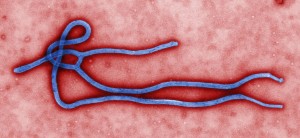Emory University Hospital’s special isolation unit has treated just a handful of patients with serious infectious diseases over its 12 years of existence.
Now it’s about to get two more.
Two American medical missionaries infected with the deadly Ebola virus will soon be treated in the Emory unit after being transported from West Africa to Georgia via air ambulance.
The patients, Dr. Kent Brantly and Nancy Writebol, are expected to arrive separately at Dobbins Air Reserve Base in Cobb County, and each will ride in a special Grady Memorial Hospital ambulance to Emory University Hospital in Atlanta. The isolation unit is housed in a discrete area of the hospital where there are no other patients.
They will be the first people infected with Ebola treated at a U.S. institution, said Dr. Bruce Ribner, an Emory infectious disease expert.
He and another Emory physician, Dr. Alexander Isakov, an emergency medicine and preparedness expert, gave details about the unit and the treatment and safety issues to a packed news conference Friday afternoon in a hospital auditorium.
They did not give a specific arrival date for the two patients.
Brantly, who works for the Christian aid group Samaritan’s Purse, treated Ebola patients at a Liberia hospital. Writebol also worked at the hospital for another U.S.-based mission group called SIM, the AP reported.
The containment unit was developed with the help of the CDC, whose headquarters are just down Clifton Road from Emory. The transfer of the patients here underscores Atlanta’s role as a global health center, anchored by the CDC.
The current Ebola outbreak in the West African countries of Liberia, Guinea and Sierra Leone has killed more than 700 people. The virus, first identified in 1976, is transmitted through direct contact with bodily fluids or blood. In the current outbreak, the fatality rate has been about 60 percent.
“That’s occurring in a health care system which does not function at the same level as our health care functions,’’ Ribner said. The three affected countries have widespread poverty and have suffered major unrest in recent years.
Currently there is no vaccine for Ebola, and there is no FDA-approved treatment.
Asked about concerns over possible disease transmission from the patients to other people, Ribner said, “We have an inordinate amount of safety associated with [this] care.’’
Ribner added, “We do not believe that any health care worker, any other patient or any visitor to our facility is in any way at risk of acquiring this infection.”
Ribner noted that Ebola virus “is not spread by some magic mechanism.’’ He said it’s transmitted in the same manner as HIV or hepatitis C, two diseases whose spread can be controlled with the proper measures.
The unit is “extremely well-contained and safe,” Ribner said.
It has enough room to handle two patients. They will be cared for by a team of four infectious disease physicians, along with two specially trained nurses for each patient.
The unit has special air handling and waste treatment. It will have phones and a plate-glass window where visitors can see the patients.
“We feel they deserve to have the highest level of care offered for the treatment,” Ribner said. He added that the Emory unit “can deliver a substantially higher level of care and substantially higher level of support” than what the patients are currently receiving.
He said one patient will arrive in the next few days, with the second following afterward.
Both patients have been reported to be stable, and are safe to travel, Ribner said. Emory was first contacted by the air ambulance company contracted by Samaritan’s Purse.
Most people with Ebola are contagious for two to three weeks, but other complications, such as respiratory or kidney failure, could prolong a hospitalization, Ribner said.
Samaritan’s Purse said in a statement: “Dr. Kent Brantly, a doctor working for Samaritan’s Purse, and Nancy Writebol, a missionary with SIM, are currently in serious condition. The two Americans who contracted Ebola in Liberia remain in the country today, but medical evacuation efforts are under way and should be completed by early next week.”
U.S. health officials Thursday warned Americans not to travel to the three-country region hit by Ebola. The travel advisory applies to nonessential travel to Guinea, Liberia and Sierra Leone.
“The bottom line is Ebola is worsening in West Africa,” said Dr. Tom Frieden, director of the CDC, who announced the travel warning.
He called Ebola “a tragic, dreadful and merciless virus.”


